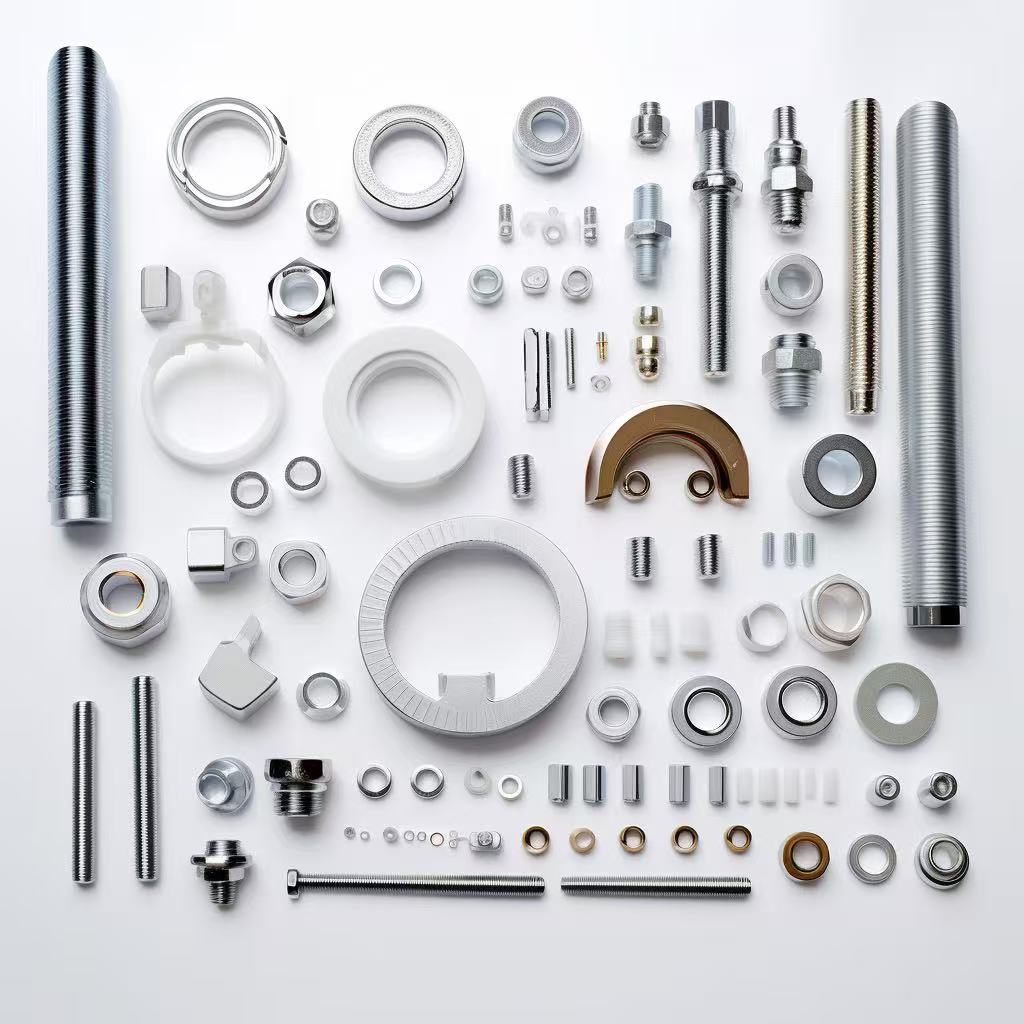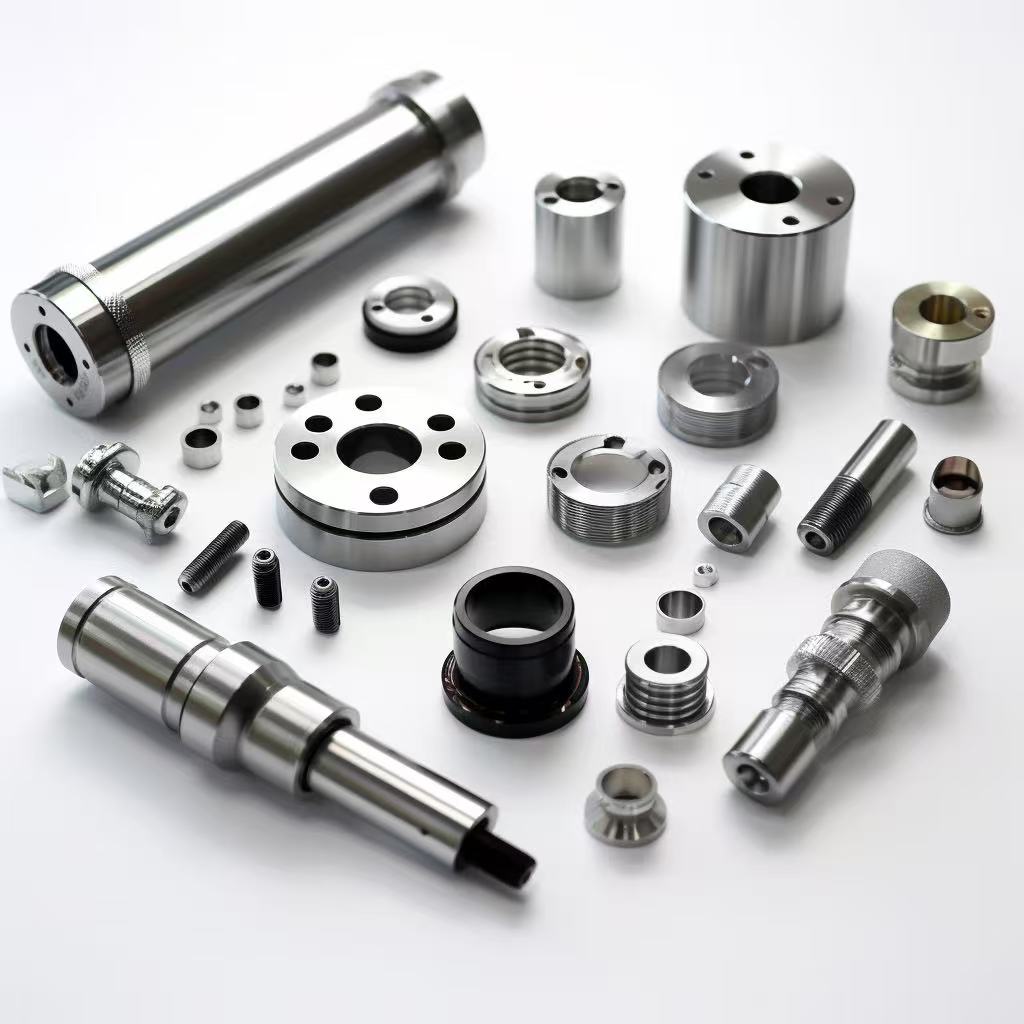Custom CNC Machined Fasteners: Precision Meets Innovation 1
Introduction: The Rise of CNC in Custom CNC Machined Fasteners Manufacturing
Machined Fasteners with the advent of Industry 4.0 has revolutionized manufacturing, bringing automation, precision, and flexibility to production lines. Among the most transformative technologies is Computer Numerical Control (CNC) machining, which has enabled the mass production of highly specialized, precision machined fasteners—complex, non-standard components that traditional manufacturing methods struggle to produce efficiently. CNC machined fasteners, such as custom bolts, threaded inserts, and high-tolerance spacers, are critical in industries like aerospace, automotive, and medical devices, where exacting specifications and material integrity are paramount. By leveraging advanced CNC systems, manufacturers can achieve tight tolerances, intricate geometries, and superior surface finishes on machined fasteners, ensuring reliability in even the most demanding applications.
In the past, standard machined fasteners (such as screws, bolts, and washers) were sufficient for most applications. However, as industries evolve—ranging from aerospace and automotive to medical devices and consumer electronics —many companies now require custom fasteners to meet unique design specifications. These non-standard fasteners, including machined washer, machined screws, machined nuts ensure better performance, durability, and integration into proprietary systems.
This blog explores how CNC machining has become indispensable in producing non-standard machined fasteners including machined washer, machined screws, machined nuts , with real-world examples of custom screws and washers , and concludes with insights into the future of fastener manufacturing.
Why CNC Machined Fasteners Are in High Demand?
1. Aerospace: Lightweight Yet Ultra-Strong Fasteners
The aerospace industry requires high-performance titanium and nickel-alloy fasteners that combine extreme strength with minimal weight. Machined fasteners in this sector must withstand intense stress, vibration, and temperature fluctuations while meeting stringent FAA and AS9100 standards. Examples include:
- Aerospace-grade bolts & screws for airframe assembly
- Specialized rivets & washers for jet engine components
- Threaded inserts for composite material fastening
2. Medical Devices: Biocompatible & Corrosion-Resistant Fasteners
Surgical implants and medical equipment demand machined fasteners made from medical-grade stainless steel (316L), titanium, or PEEK to ensure biocompatibility and long-term resistance to bodily fluids. Critical applications include:
- Bone screws & orthopedic fixation devices
- Titanium fasteners for MRI-compatible equipment
- Micro-scale screws for minimally invasive surgical tools
3. Automotive & EV: High-Torque & Vibration-Resistant Fasteners
The shift toward electric vehicles (EVs) and lightweight automotive designs has increased demand for high-strength, precision-machined fasteners capable of enduring extreme forces. Key requirements include:
Vibration-resistant thread-locking fasteners for electric motor assemblies
High-torque fasteners for battery housings & power modules
Aluminum & magnesium alloy bolts for weight reduction
Materials and Coatings for High-Performance Fasteners
The choice of material and coating significantly impacts a fastener’s performance.
Common Materials for CNC Machined Fasteners
- Stainless Steel – Corrosion-resistant, strong, and widely used in medical and marine applications.
- Titanium – Lightweight yet strong, ideal for aerospace and high-performance automotive uses.
- Aluminum – Lightweight and corrosion-resistant, used in electronics and automotive industries.
- Exotic Alloys (Inconel, Hastelloy) – Resistant to extreme heat and chemicals, used in oil & gas and aerospace.
- Plastics (PEEK, PTFE) – Non-conductive and chemical-resistant, used in medical and electronics.
Protective Coatings for Enhanced Performance
- Zinc Plating – Prevents rust in steel fasteners.
- Anodizing (for Aluminum) – Improves corrosion and wear resistance.
- DLC (Diamond-Like Carbon) Coating – Reduces friction and increases durability.
- Passivation (for Stainless Steel) – Enhances corrosion resistance by removing free iron particles.
Selecting the right material and coating ensures longevity, reliability, and performance in demanding environments.
CNC Machining in Non-Standard Fasteners Production
1. Custom CNC Machined Screws
Example: Security Screws for High-End Electronics
Many premium electronics (e.g., smartphones, gaming consoles) use proprietary screws to deter tampering. A common design is the “Pentalobe” screw (used by Apple), which requires a specialized driver.
How CNC Machining Helps:
Precision Threading: CNC lathes cut exact thread pitches (e.g., micro-threads for compact devices).
Complex Head Designs: CNC milling machines create unique drive patterns (star, hexalobe, or tri-wing).
Material Flexibility: CNC works with stainless steel, titanium, or even PEEK plastic for specialized needs.
Result:
Tamper-resistant fasteners that protect intellectual property.
Consistent quality across millions of units.
2. Custom CNC Machined Washer
Example: Shoulder Washers for Industrial Pumps
In high-pressure fluid systems, standard washers often fail due to vibration, corrosion, or misalignment . A CNC-machined shoulder washer (made from PTFE or stainless steel) can solve these issues.
How CNC Machining Helps:
Tight Tolerances (±0.005mm): Ensures perfect fit in flanges and joints.
Multi-Material Compatibility: Can machine PTFE for chemical resistance or Inconel for extreme heat .
Custom Geometries: Produces stepped washers, flanged spacers, or conductive shims as needed.
Result:
Longer-lasting seals in corrosive environments.
Reduced maintenance costs in industrial machinery.
The Future of CNC-Machined Fasteners, machined washer, machined screws, machined nuts
1. Smart Fasteners & IoT Integration
Embedded sensors in fasteners to monitor torque, temperature, and wear in real time.
RFID-enabled screws for automated inventory tracking in factories.
2. Additive Manufacturing (3D Printing) + CNC Hybrid
3D printing for prototyping complex designs.
CNC finishing for ultra-smooth threads and precision fits.
3. Sustainability in Machined Fasteners Production
Recyclable materials (aluminum, titanium) to reduce waste.
AI-driven CNC optimization to minimize material usage.
Innovations in Fastener Design and Manufacturing
The fastener industry is evolving with new technologies.
Smart Fasteners with Embedded Sensors
- Monitor tension, temperature, and vibration in real-time (IoT-enabled fasteners).
Additive Manufacturing (3D Printing) for Prototyping
- Allows rapid testing of custom fastener designs before mass CNC production.
Self-Locking and Self-Sealing Fasteners
- Prevent loosening in high-vibration environments (e.g., aerospace, automotive).
AI-Driven CNC Optimization
- Machine learning algorithms improve machining efficiency and reduce waste.
These innovations push the boundaries of what fasteners can achieve.
The Future of Custom CNC Fasteners: Precision, Customization, and Smart Innovation
As industries push for higher performance, efficiency, and sustainability, custom CNC-machined fasteners are poised to undergo significant advancements. The future of these critical components will be shaped by three key drivers: material innovation, advanced manufacturing techniques, and intelligent integration. Here’s how the landscape is expected to evolve:
1. Sustainable Material Adoption
To meet environmental regulations and reduce carbon footprints, fastener manufacturers will increasingly turn to eco-friendly materials, such as:
- Recycled metals (e.g., aerospace-grade aluminum or titanium from reclaimed sources).
- Bio-based polymers (high-strength, lightweight alternatives for non-critical applications).
- Corrosion-resistant alloys with longer lifespans to minimize waste.
These materials will not only support sustainability goals but also maintain—or even enhance—mechanical performance.
2. Hybrid Manufacturing Techniques
The integration of CNC machining with additive manufacturing (3D printing) will unlock new possibilities:
- Complex geometries: 3D printing enables intricate internal features, while CNC machining ensures precision threading and tolerances.
- Rapid prototyping: Faster iteration cycles for custom fastener designs.
- Material efficiency: Additive processes reduce waste, while CNC provides finishing accuracy.
This hybrid approach will be particularly valuable for aerospace, automotive, and medical industries.
3. Automation and AI-Driven Production
To meet demand for speed and cost-effectiveness, factories will adopt:
- Robotic CNC systems for lights-out manufacturing (24/7 production).
- Machine learning algorithms to optimize tool paths, predict wear, and reduce errors.
- Digital twins for real-time quality control and performance simulation.
Automation will shorten lead times while maintaining consistency for high-volume custom orders.
4. Smart Fastener Technology
The next frontier involves embedding intelligence into fasteners themselves:
- IoT-enabled sensors to monitor tension, temperature, or vibration in real time (e.g., for critical infrastructure or machinery).
- Self-locking or self-healing materials to prevent loosening under stress.
- RFID tagging for traceability and lifecycle management in supply chains.
Design Considerations for Custom Fasteners
The design process for custom CNC machined fasteners requires a careful balance of mechanical requirements, manufacturing feasibility, and cost considerations. Successful fastener design begins with a thorough understanding of the application’s specific demands, including load conditions, environmental factors, and assembly requirements.
Load analysis forms the foundation of any custom fastener design. Engineers must consider both static and dynamic loading scenarios, including tension, shear, torsion, and any combination thereof. Finite element analysis (FEA) has become an invaluable tool for simulating stress distribution in fastener designs, allowing engineers to optimize geometry before physical prototypes are produced 9. This is particularly important for applications subject to vibration or thermal cycling, where stress concentrations can lead to premature failure.
Thread design represents another critical consideration. While standard thread forms like UN, metric, or Whitworth serve well for many applications, custom threads may be necessary for specialized situations. Examples include:
- Buttress threads for predominantly unidirectional loading
- Acme or trapezoidal threads for power transmission applications
- Self-locking thread forms for vibration resistance
- Micro-threads for miniature fasteners in medical or electronic applications
Drive system selection impacts both assembly efficiency and security. Beyond standard slotted, Phillips, or hex drives, custom fasteners may incorporate:
- Tamper-resistant drive features for security applications
- High-torque drive systems for large fasteners
- Low-profile drives for space-constrained assemblies
- Specialty drives that combine multiple features for unique applications
Material compatibility must be carefully evaluated, particularly in assemblies combining dissimilar metals. Galvanic corrosion potential, differential thermal expansion, and hardness matching all influence material selection. In some cases, custom fasteners may incorporate insulating washers or sleeves to prevent galvanic couples between dissimilar metals.
Manufacturability considerations are equally important in custom fastener design. While CNC machining offers tremendous flexibility, certain design features can significantly impact production efficiency and cost. Design for Manufacturing (DFM) principles suggest:
- Minimizing deep, small-diameter holes that require specialized tooling
- Avoiding sharp internal corners that create stress concentrations and tool wear
- Standardizing features where possible to leverage existing tooling
- Considering alternative manufacturing methods for high-volume production
The emergence of generative design tools powered by artificial intelligence is beginning to transform custom fastener design. These systems can propose optimized geometries based on specified load cases and constraints, often resulting in designs that human engineers might not conceive. When combined with additive manufacturing techniques, these tools enable the creation of fasteners with organic, weight-optimized forms that maintain strength while minimizing material usage
Conclusion: CNC Machining is the Backbone of Modern Fastener Innovation
The shift toward non-standard fasteners reflects a broader trend in manufacturing: customization, precision, and performance optimization . CNC machining has become the go-to solution for producing these specialized components, offering unmatched accuracy, scalability, and material versatility .
As industries continue to push the boundaries of design—whether in EVs, robotics, or space exploration —CNC-machined fasteners will remain a critical enabler of innovation . Companies that invest in custom fastener solutions will gain a competitive edge in durability, security, and assembly efficiency.
What’s next? Perhaps self-tightening smart bolts or biodegradable fasteners —only CNC machining can turn these ideas into reality.
Would you like recommendations on CNC materials or fastener design best practices? Let me know in the comments!




Αφήστε μια απάντηση